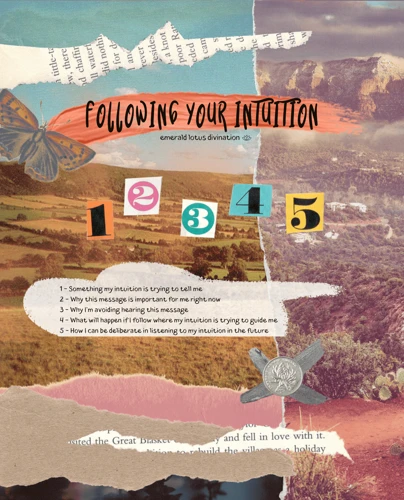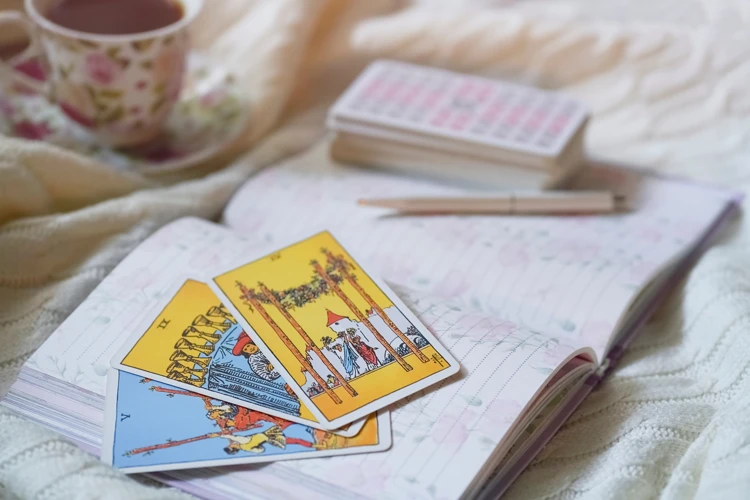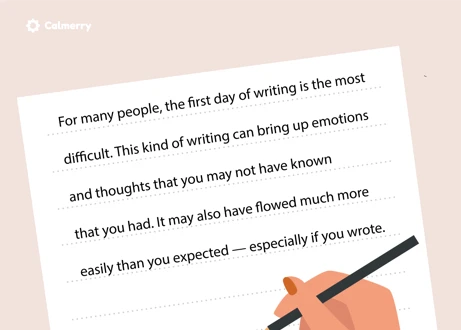Navigating through life can sometimes feel like a maze without a clear path. In these moments, we often rely on our intuition to guide us. But what exactly is intuition, and why is it so important? Intuition is the innate ability to understand or know something without relying on conscious reasoning. It is that gut feeling, that inner voice that whispers to us, guiding our decisions and actions. Enhancing our intuition can bring clarity and insight, helping us make better choices. In this article, we will explore how journaling and reflective writing can play a crucial role in developing and enhancing our intuition. By incorporating these practices into our daily lives, we can tap into our intuitive wisdom and navigate the complexities of life with greater ease and confidence. So, let’s dive deeper into the world of intuition and discover how to unlock our inner knowing through the power of words and reflection.
Contents
- The Importance of Intuition
- Journaling and Intuition
- Reflective Writing Techniques
- Enhancing Intuition through Journaling and Reflection
- Exercises to Boost Intuition
- Conclusion
-
Frequently Asked Questions
- 1. How can journaling enhance intuition?
- 2. Can journaling help me make better decisions?
- 3. Are there specific journaling prompts for intuitive exploration?
- 4. What is reflective writing?
- 5. How can reflective writing help in cultivating intuitive insights?
- 6. Is it essential to have a regular journaling practice?
- 7. Can I incorporate reflective writing into my daily life?
- 8. What is free writing, and how can it boost intuition?
- 9. How does visual journaling enhance intuitive insights?
- 10. Can enhancing intuition through journaling and reflection benefit all areas of life?
- References
The Importance of Intuition

Intuition is a powerful tool that resides within all of us. It is often described as a “gut feeling” or an inner knowing that guides our decision-making process, even when we can’t logically explain it. While it may seem mysterious, intuition is actually a result of the deep connections our mind and body make with the world around us. It goes beyond our regular thought processes and taps into a realm of subconscious knowledge and perception. Honoring our intuition allows us to access a wealth of information that may not be readily available through rational thinking alone.
Intuition plays a significant role in our lives and can have a profound impact on our decision-making, relationships, and overall well-being. Here are a few reasons why intuition is important:
a) Accessing Subconscious Wisdom: Our intuition draws on our subconscious mind, which holds a wealth of experiences, memories, and knowledge that we may not be consciously aware of. By embracing our intuition, we tap into this vast well of wisdom and can make decisions based on a deeper understanding of ourselves and the world around us.
b) Guiding us in Uncertain Situations: Life is full of uncertainties, and logic alone may not always provide clear answers. Intuition acts as a guiding force during these ambiguous moments, helping us navigate through challenges and make choices that are aligned with our true desires and values.
c) Recognizing Signs and Symbols: Intuition can heighten our awareness of the subtle signs and symbols that the universe presents to us. By trusting our intuition, we become more attuned to these messages and can follow their guidance to uncover hidden opportunities or avoid potential pitfalls.
d) Enhancing Creativity and Innovation: Intuition is closely linked to creativity and innovation. It allows us to think outside the box and explore new possibilities, leading to fresh ideas and solutions. By cultivating our intuition, we can unlock our creative potential and bring forth originality in various aspects of our lives.
To truly harness the power of intuition, it is important to develop and strengthen this innate ability. Journaling and reflective writing offer effective methods for cultivating our intuition and reaping its many benefits. By exploring our thoughts, feelings, and experiences through these practices, we can deepen our connection with our intuitive self and unlock greater insights into ourselves and the world around us.
1. What is Intuition?
Intuition is a fascinating and powerful aspect of human consciousness. It is often described as a form of inner knowing or a gut feeling that arises without conscious reasoning. However, defining intuition can be a complex task, as it encompasses various elements and layers. At its core, intuition is an innate ability that allows us to understand or sense something without relying solely on conscious thought processes.
Here are a few key aspects that help us understand what intuition is:
- Immediate Perception: Intuition operates on a level beyond logical reasoning and analysis. It arises spontaneously and provides us with immediate insights or understandings. It allows us to tap into our subconscious mind and make connections that may not be apparent through deliberate thought. Intuition can be seen as a rapid and direct form of knowledge that bypasses conscious thinking.
- Non-Linear Process: Unlike logical reasoning, intuition does not follow a linear path. It is often characterized by leaps, hunches, and flashes of insight. Intuitive knowledge may not be easily explained or logically deduced, but it can be highly accurate and valuable in guiding our decisions and actions.
- Embodied Wisdom: Intuition is not just a product of the mind; it is deeply connected to our entire being. Our body holds a wealth of wisdom and information that informs our intuitive senses. Paying attention to physical sensations and the subtle signals our body sends can help us tap into our intuitive intelligence. Exploring the five senses is one way to enhance our intuition and deepen our connection to the world around us. (To learn more about this, you can read our article on exploring the five senses to enhance intuition.)
- Recognizing Signs and Symbols: Intuition often communicates through signs, symbols, and synchronicities. It can manifest in dreams, meaningful coincidences, and intuitive nudges that guide us in a particular direction. By developing our ability to recognize these signs, we can further trust and strengthen our intuition. (To delve deeper into this topic, you may want to read our article on recognizing signs and symbols in intuition.)
- Honoring our Gut Feeling: One of the most common manifestations of intuition is the “gut feeling” or a deep sense of knowing that arises within us. This feeling often emerges from the depths of our being, guiding us along the right path. Learning to honor and trust our gut feelings can lead to better decision-making and a more aligned and fulfilling life. (For more on this, check out our article on honoring the gut feeling and trusting intuition.)
Understanding the nature of intuition allows us to appreciate its significance and harness its power. By developing and nurturing our intuitive abilities, we can access a deep well of wisdom and enhance our overall well-being.
2. Why Is Intuition Important?
There are several reasons why intuition is important in our lives. Let’s explore them in more detail:
a) Faster Decision-Making: Intuition can help us make decisions more quickly and efficiently. It bypasses the need for extensive analysis or deliberation, allowing us to trust our instincts and make choices with confidence.
b) Enhancing Self-Trust: Trusting our intuition means trusting ourselves. It helps build self-confidence and self-assurance, as we learn to rely on our inner knowing and wisdom. This self-trust can extend to other areas of our lives, leading to greater overall fulfillment and satisfaction.
c) Improving Relationships: Intuition plays a crucial role in interpersonal relationships. It enables us to better understand others, anticipate their needs, and empathize with their emotions. By listening to our intuition, we can cultivate deeper connections and foster healthier, more fulfilling relationships.
d) Navigating Uncertainty: Life is unpredictable, and uncertainties can arise at any moment. Intuition serves as a guiding compass during these uncertain times, offering insights and guidance when we need it most. It helps us navigate through challenging circumstances and make choices that align with our authentic selves.
e) Enhancing Creativity and Innovation: Intuition and creativity go hand in hand. By tapping into our intuitive powers, we can unlock our creative potential and generate innovative ideas. Intuition allows us to think outside the box, break free from conventional thinking, and explore new possibilities.
f) Making Better Decisions: Intuition can provide guidance when faced with complex decisions. It takes into account not only logical reasoning but also our emotions, values, and desires. By incorporating intuition into our decision-making process, we can make choices that align with our authentic selves and bring us closer to our goals and aspirations.
Intuition is a valuable asset that can bring numerous benefits to our lives. It allows us to tap into our innate wisdom, make decisions with confidence, navigate uncertainties, foster meaningful connections, and unleash our creative potential. By recognizing the importance of intuition and actively cultivating it, we can lead more fulfilling, authentic, and purposeful lives.
Journaling and Intuition

Journaling has long been recognized as a powerful tool for self-reflection, personal growth, and creative expression. But did you know that journaling can also enhance our intuition? The act of writing down our thoughts, emotions, and experiences creates a deeper level of self-awareness and opens up channels for intuitive insights to emerge. Here are two ways in which journaling and intuition are closely intertwined:
1. The Role of Journaling in Developing Intuition:
– Journaling serves as a form of active listening to our inner self. By putting pen to paper, we create a space for self-expression and introspection. This process allows us to bypass the noise of our everyday thoughts and tap into our intuitive wisdom.
– Writing down our dreams, aspirations, and goals helps to clarify our desires and intentions. This clarity brings us closer to our authentic selves and enables us to make choices that are aligned with our values and intuition.
– Journaling prompts, such as “What is my gut telling me?”, “What signs or symbols have I noticed lately?”, or “How can I honor my intuition in my daily life?” encourage us to explore our intuitive insights and deepen our understanding of ourselves.
2. Journaling Prompts for Intuitive Exploration:
– Reflect on a recent decision you made based on intuition. Write about the circumstances leading up to the decision, how you felt, and the outcome. Was there a particular moment or inner voice that guided you?
– Explore any recurring dreams or symbols you’ve experienced. Write about the emotions, images, or themes within these dreams or symbols, and reflect on what they might be trying to communicate to you.
– Describe a time when you ignored your intuition and regretted it. What signs or red flags did you notice? What can you learn from this experience moving forward?
Incorporating regular journaling practice into our lives can enhance our intuition by providing a safe and non-judgmental space for self-reflection. It allows us to gain deeper insights into our thoughts, emotions, and experiences, while also unclogging our minds and making room for intuitive wisdom to surface. By integrating journaling and intuition, we can strengthen our connection to our inner guidance and make more authentic choices in all aspects of our lives.
1. The Role of Journaling in Developing Intuition
Journaling plays a crucial role in developing and enhancing our intuition. It is a practice that allows us to engage with our thoughts, feelings, and experiences in a meaningful and reflective way. By putting pen to paper, we create a safe space for introspection and self-expression. Through journaling, we can uncover patterns, gain clarity, and strengthen our intuitive abilities.
One of the key ways journaling supports the development of intuition is by helping us silence the noise of our busy minds. Our daily lives are filled with distractions and external influences that can drown out our inner voice. Journaling provides us with an opportunity to slow down, quiet our thoughts, and focus inward. As we write, we can tune in to our intuition, allowing it to emerge more clearly and guide our words.
Additionally, journaling allows us to document our experiences and record our intuitive insights. By regularly jotting down our thoughts and feelings, we create a repository of valuable information that we can refer back to over time. This not only helps us track our intuitive hits and reflect on their accuracy but also allows us to identify recurring themes or patterns that may arise in our writing. These patterns can offer valuable insights into our subconscious mind and serve as important signals from our intuition.
Journaling provides a space for self-discovery and exploration. Through guided prompts or free writing, we can delve deeper into our thoughts and emotions, uncovering hidden beliefs, desires, and fears. As we connect with our inner selves through the act of writing, we gain a greater understanding of who we are and what truly matters to us. This self-awareness and introspection are essential foundations for developing intuition.
It is important to approach journaling with an open and non-judgmental mindset. Remember, there are no right or wrong answers in journaling. It is about embracing the flow of thoughts and allowing them to freely express. By letting go of self-censorship and self-editing, we create a space for our intuition to speak authentically and honestly.
In the next section, we will explore some journaling prompts specifically designed to support intuitive exploration and development. These prompts will help us dive deeper into our subconscious and unlock the wisdom stored within. So grab your journal and let’s embark on a journey of self-discovery and intuition!
2. Journaling Prompts for Intuitive Exploration
Journaling is a powerful tool for self-reflection and introspection. When it comes to enhancing our intuition, specific journaling prompts can help us dive deeper into our subconscious and tap into our intuitive wisdom. Here are some journaling prompts for intuitive exploration:
1. Reflect on Synchronicities: Write about any significant coincidences or synchronicities you have experienced recently. Explore the connections between these events and your inner thoughts or emotions. Pay attention to any patterns or messages that may arise.
2. Explore Gut Feelings: Reflect on situations where you made decisions based on a strong gut feeling. Write about the details of the situation and your initial intuitive response. Then, examine the outcome and explore how your intuition guided you in that particular moment.
3. Describe Your Dreams: Dreams can hold valuable insights from our subconscious. Write down any dreams or dream fragments you remember and explore their symbolism and meaning. Pay attention to recurring themes or images that may provide clues about your intuitive inclinations.
4. Connect with Nature: Spend time in nature, and then journal about your experience. Describe the sights, sounds, and sensations you encountered. Reflect on any intuitive thoughts or feelings that emerged during your time in nature and consider how they may relate to your journey of self-discovery.
5. Explore Body Sensations: Tune into your body and pay attention to any physical sensations or discomfort you may be experiencing. Journal about these sensations and explore what they might be trying to communicate to you intuitively. Trust your body’s wisdom and allow it to guide your exploration.
6. Write Freely: Engage in free writing, where you let your thoughts flow without judgment or censorship. Set a timer for a specific duration, such as 10 minutes, and allow your pen to move effortlessly across the paper. This practice can help bypass the conscious mind and access the intuitive realms within you.
Remember, there are no right or wrong answers when it comes to journaling prompts for intuitive exploration. The purpose is to tap into your inner world and listen to your intuitive voice. Allow yourself to be open and curious as you engage with these prompts, and embrace the insights that unfold. Journaling can be a powerful catalyst for enhancing your intuition and gaining a deeper understanding of yourself.
Reflective Writing Techniques

Reflective writing techniques provide a structured approach to explore our thoughts, emotions, and experiences, ultimately fostering self-awareness and insight. Here are two techniques that can be used to cultivate intuitive insights through reflective writing:
- Journaling: Journaling is a popular form of reflective writing that involves regularly recording our thoughts and experiences. It provides a safe space for self-expression and allows us to delve into our inner world. When journaling for intuitive exploration, it is helpful to set aside dedicated time each day to write freely without judgment or censoring. This stream-of-consciousness writing allows our thoughts and emotions to flow onto the page, unveiling hidden insights and intuitive nudges that may have otherwise gone unnoticed.
-
Prompt-based Writing: Prompt-based writing involves using specific writing prompts or questions to guide our reflective exploration. These prompts can be designed to specifically stimulate intuitive thinking and encourage deeper self-reflection. Some examples of prompts for intuitive exploration may include:
- “What does my intuition want to tell me today?”
- “Describe a time when I followed my intuition and the outcome surpassed my expectations.”
- “What recurring themes or patterns do I notice in my intuitive hunches?”
- “What is my gut feeling telling me about a particular situation or decision?”
By responding to these prompts honestly and openly, we can tap into the wisdom of our intuition and uncover valuable insights about ourselves and the world around us.
Both journaling and prompt-based writing can be powerful tools for cultivating intuitive insights. It is important to approach these reflective writing techniques with an open and curious mindset, allowing ourselves to explore without judgment. The act of putting our thoughts into words and reflecting on them helps to clarify our intuitive impressions and connect with our inner knowing. Regular practice of these techniques can deepen our intuition and strengthen our ability to make intuitive decisions in various aspects of our lives.
1. Understanding Reflective Writing
Reflective writing is a powerful tool for self-exploration and personal growth. It involves the process of looking inward, examining our thoughts, feelings, and experiences, and making meaning out of them. Unlike traditional journaling, which may focus more on daily activities or events, reflective writing goes deeper to uncover the underlying emotions and insights that arise from our experiences.
The essence of reflective writing lies in its ability to promote self-awareness and introspection. It encourages us to ask ourselves probing questions, such as “Why did I react that way?” or “What can I learn from this situation?” By engaging in this type of writing, we create a space for reflection and gain a deeper understanding of ourselves.
One key aspect of reflective writing is the practice of active observation. This involves observing our thoughts, emotions, and physical sensations without judgment or attachment. By simply noticing and acknowledging what arises within us, we can gain valuable insights into our patterns, beliefs, and values.
Another important element of reflective writing is the art of storytelling. We can explore our experiences by writing narratives that capture the essence of the situation and the emotions involved. By crafting these stories, we gain a different perspective on our experiences and can identify recurring themes or patterns in our lives.
Reflective writing also involves the process of critical analysis. It requires us to examine our thoughts and experiences from different angles, considering alternative perspectives and challenging our assumptions. This analytical approach helps us gain new insights and expand our understanding of ourselves and the world around us.
Incorporating reflective writing into our daily lives can be a transformative practice. It allows us to cultivate a deeper sense of self-awareness, gain clarity about our values and goals, and make more intentional decisions. By embracing reflective writing, we open ourselves up to endless possibilities for personal growth and self-discovery. So, grab a pen and paper, or open a blank document on your computer, and dive into the world of reflective writing to enhance your intuition and embark on a journey of self-exploration.
2. Techniques for Cultivating Intuitive Insights
Cultivating intuitive insights requires us to adopt specific techniques that help us tap into our inner wisdom and sharpen our intuitive abilities. Here are some techniques to consider:
a) Meditation: Meditation is a powerful practice that can quiet the mind and create a space for intuitive insights to arise. By taking time each day to sit in stillness and silence, we can cultivate a deeper connection with our intuition. This can be done through various meditation techniques such as mindfulness meditation, guided visualization, or focused breathing exercises.
b) Trusting Body Sensations: Our bodies hold valuable information that can guide us towards intuitive insights. Pay attention to physical sensations such as a quickening heartbeat, a sense of ease or discomfort, or a tingling sensation. These bodily cues can provide valuable clues about what resonates or doesn’t resonate with our intuition.
c) Engaging in Creative Practices: Creative activities such as painting, writing, dancing, or playing an instrument can open up channels for intuitive insights to flow. These practices allow us to tap into our subconscious mind and access intuitive wisdom that may be hidden beneath the surface. Don’t worry about creating something perfect; instead, focus on the process of engaging with your chosen creative outlet.
d) Spending Time in Nature: Nature has a way of calming our minds and connecting us to our intuition. Take regular walks in natural surroundings, observe the beauty around you, and let yourself be fully present in the moment. The quietude of nature can help clear mental clutter and bring forth intuitive insights.
e) Practicing Active Listening: Intuition often speaks through subtle whispers, and active listening can help us tune in to these messages. Practice active listening by being fully present in conversations, tuning in to the emotions and energy of others, and paying attention to the subtle nuances in their words and body language.
f) Trusting and Acting on Intuitive Prompts: The more we trust our intuition, the stronger it becomes. Start by honoring the small intuitive prompts that come your way and taking action on them. Whether it’s changing your route to work or reaching out to someone you haven’t spoken to in a while, acting on these intuitive nudges builds trust in our own intuitive abilities.
By incorporating these techniques into our daily lives, we can cultivate a deeper connection with our intuition and enhance our ability to tap into intuitive insights. Remember, developing intuition is an ongoing practice that requires patience and trust in the process. With time and dedication, you can strengthen your intuition and access its powerful guidance in various aspects of your life.
Enhancing Intuition through Journaling and Reflection

Journaling is a powerful tool for self-reflection and introspection. It allows us to capture our thoughts, emotions, and experiences on paper, providing us with a deeper understanding of ourselves. When it comes to enhancing intuition, maintaining a regular journaling practice is essential. Here’s how to get started:
– Set aside a specific time each day for journaling. Whether it’s in the morning to set intentions for the day or in the evening to reflect on the day’s events, consistency is key.
– Find a quiet and comfortable space where you can focus and let your thoughts flow freely. Eliminate any distractions that may hinder your concentration.
– Begin by clearing your mind and centering yourself through deep breathing or meditation. This helps create a sense of calm and openness.
– Start writing without judgment or preconceived notions. Let your thoughts and intuition guide your pen as you record your experiences and observations.
– Reflect on what you have written and look for patterns, recurring themes, or any intuitive insights that may arise. Pay attention to any intuitive hunches or gut feelings that may emerge during the process.
– Use journaling prompts specifically designed to enhance intuition, such as “What is my intuition trying to communicate to me right now?” or “What is my inner voice telling me about this situation?” These prompts can help stimulate your intuition and encourage deeper reflection.
In addition to regular journaling, incorporating reflective writing into your daily life can further enhance your intuition. Reflective writing is the practice of contemplating and analyzing your experiences to gain insights and wisdom. Here’s how to make it a part of your routine:
– Make time for reflection each day, even if it’s just a few minutes. This can be done through focused contemplation or by writing down your thoughts and observations.
– Reflect on your experiences, interactions, and emotions throughout the day. Explore the underlying meaning behind these events and consider how they align with your intuition.
– Ask yourself questions that encourage self-reflection and intuitive exploration. For example, “What lessons can I learn from this experience?” or “How can I honor my intuition in my decision-making process?”
– Practice active listening to your intuition throughout the day. Notice any intuitive nudges or subtle signals that arise, and take note of them in your reflective writing.
– Regularly review your reflective entries to identify patterns or connections between your intuition and the outcomes of various situations. This can deepen your understanding of how your intuition influences your life.
By incorporating journaling and reflective writing into your daily routine, you create an opportunity for deep introspection and intuitive growth. These practices allow you to tap into your innate wisdom, enabling you to make more aligned decisions and navigate life with greater clarity and confidence.
1. Creating a Regular Journaling Practice
Creating a regular journaling practice is essential for enhancing and strengthening our intuition. Here are some steps to help you establish a consistent journaling routine:
1. Set Aside Time: Dedicate a specific time each day to engage in journaling. It could be in the morning before starting your day, during lunch breaks, or in the evening before bed. Consistency is key in developing a habit.
2. Find a Quiet Space: Choose a quiet and peaceful environment where you can focus and reflect without distractions. This could be a cozy corner in your home, a serene outdoor setting, or any place where you feel comfortable and at ease.
3. Choose the Right Tools: Select a journal or notebook that inspires you and makes you want to pick it up. Experiment with different types of journals, such as lined or blank pages, to find the style that resonates with you. Additionally, using pens, markers, or colored pencils can enhance the experience and make it more visually engaging.
4. Start with Prompts: If you’re unsure where to begin, journaling prompts can be helpful in kickstarting your writing. These prompts can be questions or statements designed to stimulate your thoughts and encourage self-reflection. For example, you could write about a recent difficult decision you made and explore how your intuition played a role in that process.
5. Follow Your Flow: Allow yourself to write freely without judgment or self-editing. Let your thoughts flow onto the page without worrying about grammar or structure. This type of stream-of-consciousness writing helps to tap into your intuition and uncover hidden insights.
6. Reflect and Review: Take time to go back and read your journal entries periodically. This retrospective review allows you to observe patterns, identify recurring themes, and gain deeper understanding of your intuition over time.
By committing to a regular journaling practice, you create a space for self-exploration and self-awareness. Journaling becomes a conduit for tapping into your intuition and developing a deeper connection with your inner wisdom. Remember, the beauty of journaling lies in the process, not just the end result. So, enjoy the journey and let your intuition guide you as you embark on this meaningful practice.
2. Incorporating Reflective Writing into Daily Life
Incorporating reflective writing into our daily lives can be a transformative practice that enhances our intuition and self-awareness. Here are some effective strategies to make reflective writing a regular habit:
a) Set Aside Dedicated Time: Carve out specific time each day for reflective writing. It could be in the morning as a way to start the day with intention, or in the evening to reflect on the events and emotions of the day. By creating a routine, we make reflective writing a consistent part of our day.
b) Find a Quiet and Comfortable Space: Choose a quiet and comfortable space where you can focus without distractions. It could be a cozy corner in your home, a peaceful park, or a calming coffee shop. Make sure the environment allows you to feel relaxed and in the right mindset for reflection.
c) Start with a Clear Intention: Before beginning your reflective writing session, set an intention for what you hope to gain from it. It could be gaining insights into a specific situation, exploring your emotions, or seeking guidance on a decision. This intention will guide your writing and help you delve deeper into your thoughts and feelings.
d) Use Prompts or Questions: If you’re not sure where to start, use prompts or questions to stimulate your reflective thinking. Prompts can be open-ended questions like “What am I grateful for today?” or “What lessons have I learned recently?” These prompts encourage introspection and provide a starting point for your writing.
e) Write Freely and Without Judgment: When engaging in reflective writing, let your thoughts flow freely without judgment or self-censorship. Write without worrying about grammar, punctuation, or structure. This allows your subconscious thoughts to surface and provides a space for intuitive insights to emerge.
f) Reflect on Your Writing: After completing your reflective writing, take a few moments to reflect on what you have written. Look for patterns, key themes, or recurring emotions. Consider how your writing connects to your intuition and what it reveals about yourself and your experiences.
By incorporating reflective writing into our daily lives, we create the opportunity to uncover deeper layers of ourselves, gain clarity on our thoughts and emotions, and ultimately enhance our intuition. It is through this practice of self-reflection that we can learn to trust our inner voice and make choices that align with our truest selves. So, let reflective writing become a valuable tool in your journey of self-discovery and intuitive growth.
Exercises to Boost Intuition
1. Engaging in Free Writing:
Free writing is a simple yet powerful exercise that can help unlock your intuitive insights. Set aside some time in a quiet and comfortable space. Start by writing continuously without worrying about grammar, punctuation, or coherence. Let your thoughts flow freely onto the page, allowing your subconscious mind to guide the writing process. This exercise helps bypass your analytical mind and taps into the deeper realms of intuition. Remember, the key is to let go of judgment and expectations. You might be surprised by the profound insights and clarity that arise from this practice.
2. Visual Journaling for Intuitive Insights:
Visual journaling combines words with visual elements to deepen your intuitive exploration. Begin by gathering art supplies such as pens, markers, colored pencils, and magazines. Allow yourself to be guided by your intuition as you create visual representations of your thoughts, feelings, and experiences. This process taps into your subconscious mind and can reveal hidden patterns, symbols, and insights. Trust the images that emerge and write about your observations and interpretations. The combination of visual art and reflective writing can deepen your understanding of yourself and enhance your intuitive abilities.
3. Meditating on Symbols and Images:
Symbols and images hold immense power in the realm of intuition. Engage in meditation or visualization exercises that focus on specific symbols or images that resonate with you. This can be a personal object, a natural element, or a universal symbol. Close your eyes, breathe deeply, and allow the symbol or image to come to mind. Explore it with all your senses, noticing any sensations, emotions, or thoughts that arise. Reflect on the meaning or messages behind the symbol or image. This practice helps strengthen your intuitive connection to the collective unconscious and expands your ability to interpret symbols and signs in your daily life.
4. Seeking Nature’s Wisdom:
Nature has a way of speaking to us through its beauty, cycles, and patterns. Spend time in nature, whether it’s a walk in the park, sitting by a river, or hiking on a trail. Observe the colors, textures, sounds, and scents around you. Notice the intricate details and the interconnectedness of all living things. Allow yourself to let go of thoughts and simply be present in the natural environment. Nature holds its own wisdom, which can inspire and activate your intuition. Take note of any insights or inspirations you receive during your time in nature and reflect on their significance.
By incorporating these exercises into your daily routine, you can strengthen your intuitive abilities and enhance your connection to your inner wisdom. Remember, intuition is a skill that can be cultivated and developed over time through consistent practice and reflection. So, embrace these exercises and enjoy the journey of discovering and enhancing your intuition.
1. Engaging in Free Writing
Engaging in free writing is a powerful exercise that can enhance intuition and tap into our subconscious mind. Free writing involves setting aside a specific amount of time (such as 10-15 minutes) to write continuously without any constraints or rules. The goal is to let our thoughts flow freely onto the page, without judgment or concern for grammar or punctuation.
During free writing, we allow our intuition to take the lead, as we bypass the critical and analytical mind. This practice helps us uncover hidden thoughts, emotions, and insights that may not have surfaced through traditional thinking. By letting go of inhibitions and allowing ourselves to write without constraints, we access a deeper level of self-expression.
To engage in free writing, follow these steps:
1. Find a quiet and comfortable place where you can write without distractions. Set a timer for the desired duration, such as 10 or 15 minutes.
2. Start by picking a prompt or a question to focus your writing. It can be something related to a specific area in your life or a topic you want to explore intuitively.
3. Once the timer starts, begin writing continuously without pausing or censoring yourself. Let your thoughts flow naturally, even if they seem unrelated or nonsensical. Do not worry about grammar, spelling, or punctuation.
4. Keep writing until the timer goes off, or until you feel like you have reached a natural stopping point. It’s important to honor your own instincts and intuition during this process.
5. After finishing the free writing session, take some time to reflect on what you have written. Look for patterns, recurring themes, or any insights that may have emerged. Pay attention to any strong emotions or intuitive nudges that arose during the writing process.
Engaging in regular free writing sessions can help train our minds to quiet the noise of everyday life and tap into our intuitive wisdom. This practice allows for the exploration of thoughts and emotions that may have been buried beneath the surface. It can reveal hidden desires, fears, and solutions to problems, providing us with greater clarity and understanding. By embracing the flow of free writing, we open ourselves up to deeper insights and strengthen our connection to our intuition.
2. Visual Journaling for Intuitive Insights
Visual journaling is a powerful technique that combines both words and images to tap into our intuitive insights. It involves using art mediums such as drawing, painting, collage, or any other form of visual expression to explore our thoughts, emotions, and subconscious mind. This process allows us to access and communicate with our intuition on a deeper level, bypassing the limitations of language and rational thinking. Here are some key ways in which visual journaling can enhance our intuitive insights:
a) Non-Verbal Communication: Visual journaling provides a way to express ourselves without relying solely on words. Sometimes, our intuition speaks to us in images, symbols, or colors that can be difficult to capture or convey through traditional writing alone. By using visual elements, we can access a different mode of communication and gain a deeper understanding of the messages our intuition is trying to convey.
b) Engaging our Senses: When we create visual representations in our journal, we not only engage our visual sense but also our sense of touch, movement, and even sound. This multisensory experience helps to deepen our connection with our intuition and enhances our ability to receive intuitive insights. By immersing ourselves in the creative process, we heighten our awareness and open ourselves up to new perspectives and ideas.
c) Symbolic Exploration: Visual journaling allows us to delve into the realm of symbolism and metaphor. Our intuition often communicates through symbols and imagery that may have personal or universal significance. By incorporating these symbols into our visual journal, we can unravel their deeper meanings and gain valuable insights into our subconscious mind and inner wisdom.
d) Emotional Expression: Visual journaling provides a safe and non-judgmental space to express our emotions. Sometimes, our emotions carry valuable intuitive messages that words alone may struggle to express. Through visual expression, we can tap into these emotions and uncover the underlying intuitive guidance they hold. By exploring our emotions visually, we can gain greater clarity and understanding of their significance in our lives.
When engaging in visual journaling for intuitive insights, there are no rules or expectations. The process is a personal and authentic exploration of our inner world. Allow yourself to experiment with different art mediums, colors, textures, and images that resonate with you. Trust your intuition to guide your creative choices and embrace the process as a way to unlock deeper layers of your intuitive wisdom. Remember, there are no right or wrong ways to express yourself visually. The goal is to listen, observe, and honor the unique insights that emerge from this intuitive journey.
Conclusion
In conclusion, intuition is a valuable and essential tool that can guide us through life’s uncertainties and help us make more informed decisions. It taps into our subconscious wisdom and connects us to a deeper understanding of ourselves and the world around us. By honoring and trusting our intuition, we can access invaluable insights, recognize signs and symbols, enhance our creativity, and navigate through challenging situations with greater clarity. Journaling and reflective writing provide powerful avenues for developing and enhancing our intuition. Through regular practice, we can cultivate a deeper connection with our intuition and gain a clearer understanding of our thoughts, feelings, and experiences. So, let’s embrace the power of intuition and let it be our compass as we journey through life, making choices that align with our authentic selves and lead us towards fulfillment and success. Trust your inner knowing and listen to the whispers of your intuition, for it holds the key to unlocking a world of infinite possibilities.
Frequently Asked Questions
1. How can journaling enhance intuition?
Journaling enhances intuition by providing a space for self-reflection and self-expression. Through the act of writing, we can tap into our subconscious mind and uncover deeper insights and intuitive guidance.
2. Can journaling help me make better decisions?
Yes, journaling can help you make better decisions by allowing you to explore your thoughts, feelings, and intuition. Writing down your thoughts and intentions can bring clarity and help you align your choices with your core values.
3. Are there specific journaling prompts for intuitive exploration?
Yes, there are various journaling prompts that can enhance intuitive exploration. Some examples include writing about your dreams, asking open-ended questions, exploring synchronicities, or reflecting on your emotions and their underlying meanings.
4. What is reflective writing?
Reflective writing involves introspection and exploring the meaning and significance of our experiences. It encourages us to delve deep into our thoughts and emotions, gaining insights and learning from our past.
5. How can reflective writing help in cultivating intuitive insights?
Reflective writing enables us to tap into our intuition by providing a structured platform for self-analysis. By reflecting on our experiences and emotions, we can uncover patterns, receive intuitive guidance, and gain a deeper understanding of ourselves and the world around us.
6. Is it essential to have a regular journaling practice?
While having a regular journaling practice is beneficial, it is not essential. The key is to find a journaling routine that works for you, whether it’s writing daily, weekly, or whenever you feel inspired. Consistency can help cultivate a deeper connection with your intuition, but finding a balance is important.
7. Can I incorporate reflective writing into my daily life?
Absolutely! Reflective writing can be incorporated into your daily life in various ways. You can set aside a few minutes each day to reflect on your experiences, write down any insights or intuitive thoughts that arise, or use writing as a tool to explore your emotions and thoughts about specific situations.
8. What is free writing, and how can it boost intuition?
Free writing involves allowing your thoughts to flow onto the paper without judgment or restriction. By letting go of any inhibitions, you create a space for your intuition to surface freely. Free writing can unlock hidden insights, creative ideas, and intuitive guidance.
9. How does visual journaling enhance intuitive insights?
Visual journaling combines words with images, using art as a form of expression. Engaging in visual journaling allows you to tap into your intuition by accessing your subconscious mind through the creation of visual representations. It can lead to profound insights and a deeper connection with your intuitive wisdom.
10. Can enhancing intuition through journaling and reflection benefit all areas of life?
Yes, enhancing intuition through journaling and reflection can benefit all areas of life. It can improve decision-making, foster creativity, deepen self-awareness, strengthen relationships, and bring more alignment and fulfillment in various aspects of life.






